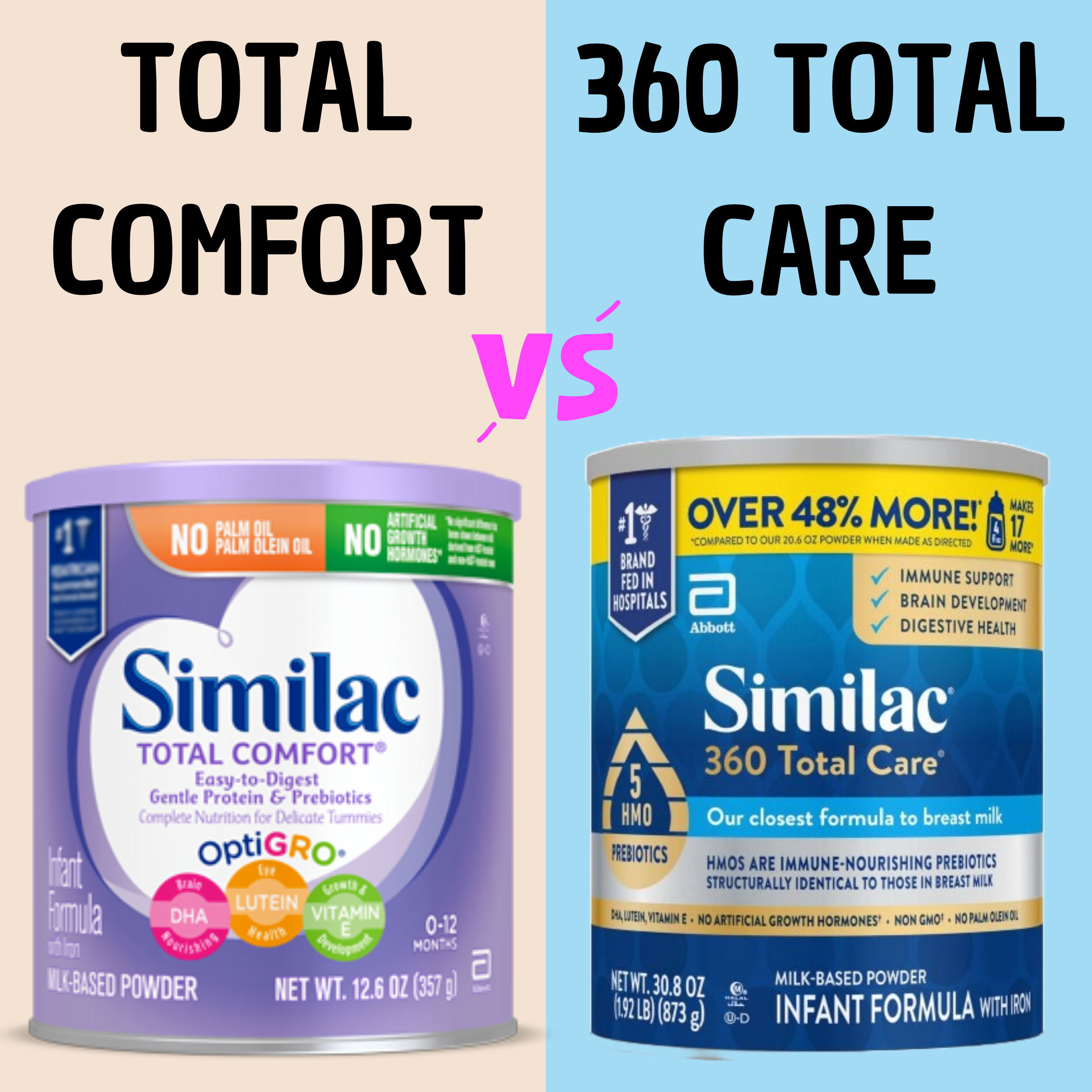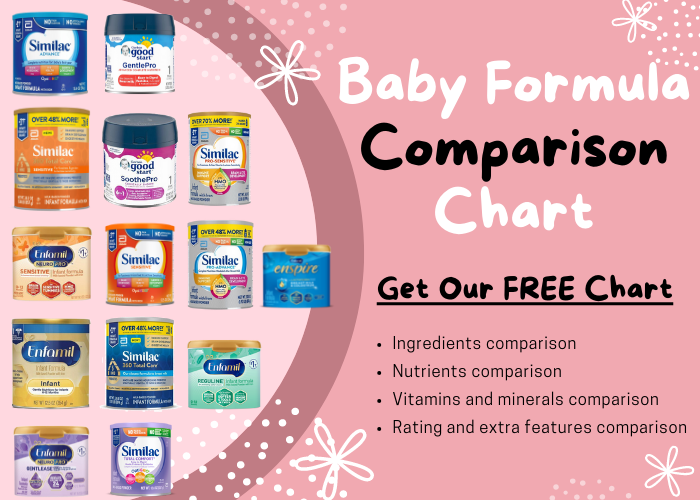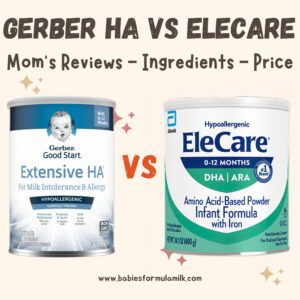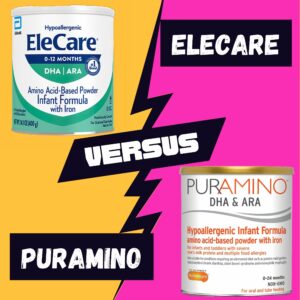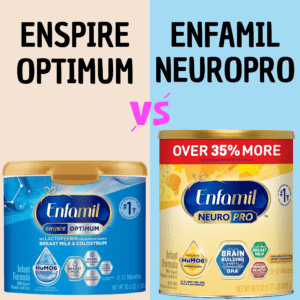Key Differences?
Similac 360 Total Care and Similac Total Comfort are both GMO-Free formulas for babies from 0 to 12 months of age, but cater to different infant needs, each presenting distinct features in their formulations:
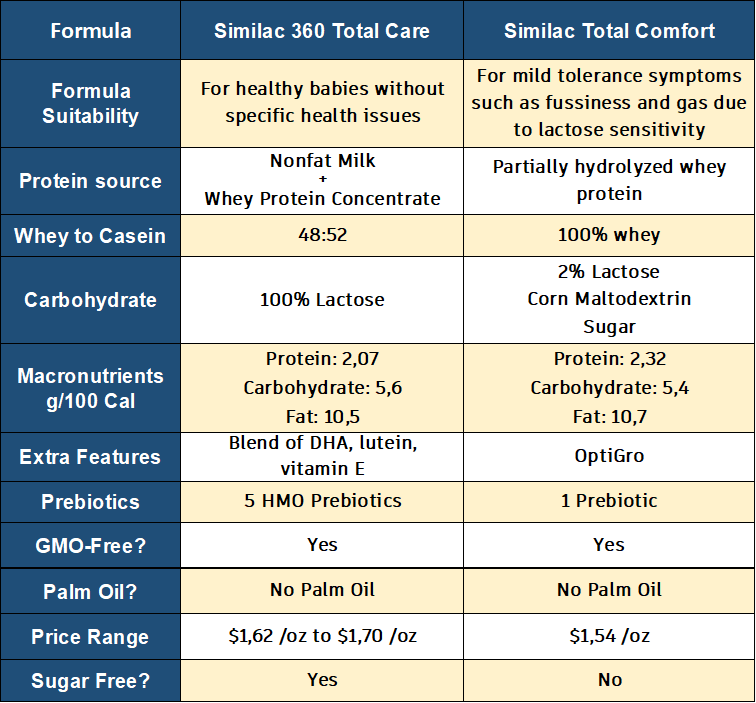
Similac 360 Total Care is designed for healthy babies without specific health issues, featuring a protein source combination of nonfat milk and whey protein concentrate. This formula boasts 100% lactose as the carbohydrate source, resulting in a high carbohydrate level. Notably, it has 5 HMO prebiotics for added benefits. On the other hand, Similac Total Comfort targets infants with mild tolerance symptoms like fussiness and gas due to lactose sensitivity. Its protein source is partially hydrolyzed whey protein, with a whey-only composition and a carbohydrate mix of 2% lactose, corn maltodextrin, and sugar. This formula also includes OptiGro and 1 prebiotic. While GMO-free, Similac Total Comfort is not sugar-free and is priced at $1.54/oz.
Which One to Choose?
Choosing between these two formulas depends on the specific needs and tolerances of your baby. Here’s a detailed comparison to help you make an informed decision:
Similac 360 Total Care:
Formula Suitability: Similac 360 Total Care is a standard milk-based formula suitable for healthy babies without specific health issues. It is designed to provide comprehensive nutrition for infants who don’t have specific dietary concerns.
Carbohydrate Level: This formula has a high carbohydrate level, providing ample energy for your baby’s growth and development.
Prebiotics: It includes 5 HMO (Human Milk Oligosaccharides) prebiotics, supporting the development of a healthy gut microbiome.
Price: It is noted as expensive, reflecting its specialized formulation and added features.
Sugar-Free: It is a sugar-free formula, which may be appealing to parents aiming to limit their baby’s sugar intake.
Sizes and Forms: Similac 360 Total Care offers multiple sizes and forms, including convenient 2 fl oz and 8 fl oz options, making it practical for travel or outings.
Similac Total Comfort:
Formula Suitability: Similac Total Comfort is a partially hydrolyzed and lactose-reduced formula, specifically designed for infants with mild tolerance symptoms like fussiness and gas due to lactose sensitivity. It is also suitable for babies with a casein allergy as it is sourced only from whey protein.
Protein and Fat Levels: This formula has high levels of both protein and fat, providing essential nutrients for your baby’s growth.
Minerals: Similac Total Comfort contains high levels of minerals, contributing to bone and overall development.
Price: Similac Total Comfort is noted as more affordable compared to Similac 360 Total Care, offering a cost-effective option for parents.
In summary, if your baby has mild tolerance symptoms or a casein allergy, Similac Total Comfort is the preferable choice due to its partially hydrolyzed and lactose-reduced formula. On the other hand, if your baby is healthy and doesn’t have specific health concerns, Similac 360 Total Care provides a standard milk-based formula with added prebiotics for a healthy gut.
Consider your baby’s specific needs, your budget, and any travel requirements when making the final decision. It’s always advisable to consult with your pediatrician to ensure the chosen formula aligns with your baby’s health conditions.
Mom’s Reviews Comparison:
Based on mom’s reviews, both formulas offer distinct advantages and drawbacks:
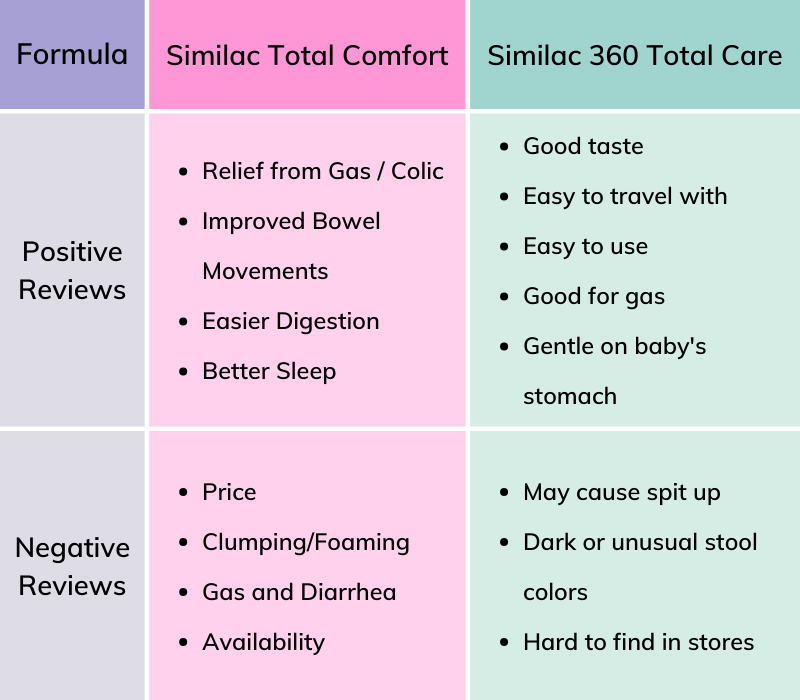
Similac Total Comfort has received positive feedback for providing relief from gas, colic, and improved bowel movements, attributed to its partially hydrolyzed protein and a carbohydrate reduction of 98% in lactose. Many users reported better sleep outcomes for their infants.
However, negative reviews highlight issues such as clumping and foaming, along with complaints about gas and diarrhea. Additionally, the formula’s limited availability in only one size has been a concern for some parents.
On the other hand, 360 Total Care has garnered positive reviews for its good taste, travel-friendly packaging with 2 fl oz and 8 fl oz ready-to-feed bottles, and its effectiveness in addressing gas issues due to 5 HMO prebiotics.
However, negative feedback includes the potential for causing spit-up, the observation of dark or unusual stool colors, and the formula’s occasional difficulty in finding in stores.
Ingredients Breakdown:
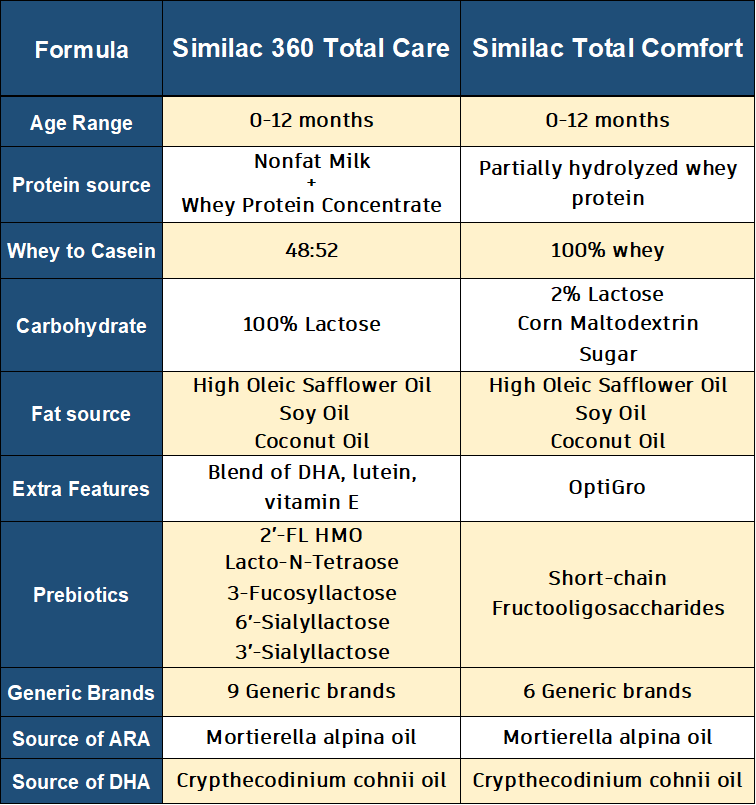
Age Range:
Both formulas are suitable for infants aged 0-12 months, addressing the nutritional needs of this crucial developmental stage.
Protein Source:
Similac 360 Total Care derives its protein from a combination of nonfat milk and whey protein concentrate. Nonfat milk serves as a source of essential nutrients, while whey protein concentrate adds protein content. The whey to casein ratio of 48:52 provides a balanced mix of fast-digesting whey and slow-digesting casein proteins, mimicking the natural composition found in breast milk.
In contrast, Similac Total Comfort features partially hydrolyzed whey protein. The term “partially hydrolyzed” indicates that the protein chains are broken down into smaller fragments, potentially making it easier for some infants to digest. Additionally, this formula relies solely on whey protein, which tends to be gentler on the digestive system.
Carbohydrate Source:
Similac 360 Total Care: The carbohydrate source in this formula is 100% lactose. Lactose is the primary carbohydrate found in breast milk and is a natural sugar that provides a high level of energy for the growing infant.
Similac Total Comfort includes a blend of carbohydrates, consisting of corn maltodextrin, sugar, and only 2% lactose. The reduced lactose content is designed to cater to infants with mild tolerance symptoms, such as fussiness and gas due to lactose sensitivity.
Extra Features and Prebiotics:
Similac 360 Total Care:
Beyond the basic nutritional components, this formula includes a blend of additional elements such as DHA (Docosahexaenoic Acid), lutein, and vitamin E. These components contribute to the overall nutritional richness and support the baby’s brain and eye development.
The prebiotic composition in this formula is comprehensive, including 2′-FL HMO (2′-Fucosyllactose), Lacto-N-Tetraose, 3-Fucosyllactose, 6′-Sialyllactose, and 3′-Sialyllactose. These prebiotics are substances that promote the growth of beneficial bacteria in the baby’s gut, contributing to a healthy digestive system.
2′-FL HMO is a type of human milk oligosaccharide (HMO), which is a complex carbohydrate naturally found in breast milk. It acts as a prebiotic, promoting the growth of beneficial bacteria, such as Bifidobacteria, in the infant’s gut. This, in turn, contributes to the establishment of a healthy and balanced gut microbiota.
Similac Total Comfort:
This formula is enriched with OptiGro, which typically includes ingredients like DHA, lutein, and vitamin E. While the specific composition may vary, OptiGro is designed to provide essential nutrients that support the baby’s growth and development.
Furthermore: This formula uses short-chain fructooligosaccharides as its prebiotic source. Fructooligosaccharides are a type of soluble fiber that can stimulate the growth of beneficial bacteria in the intestines, supporting overall digestive health.
Generic Brands:
Both formulas offer flexibility with generic options that are almost cheap by half, with 360 Total Care available in 9 generic brands and Similac Total Comfort in 6 generic brands. Read Best 6 Generic Similac Total Comfort.
Nutrient Profiles:
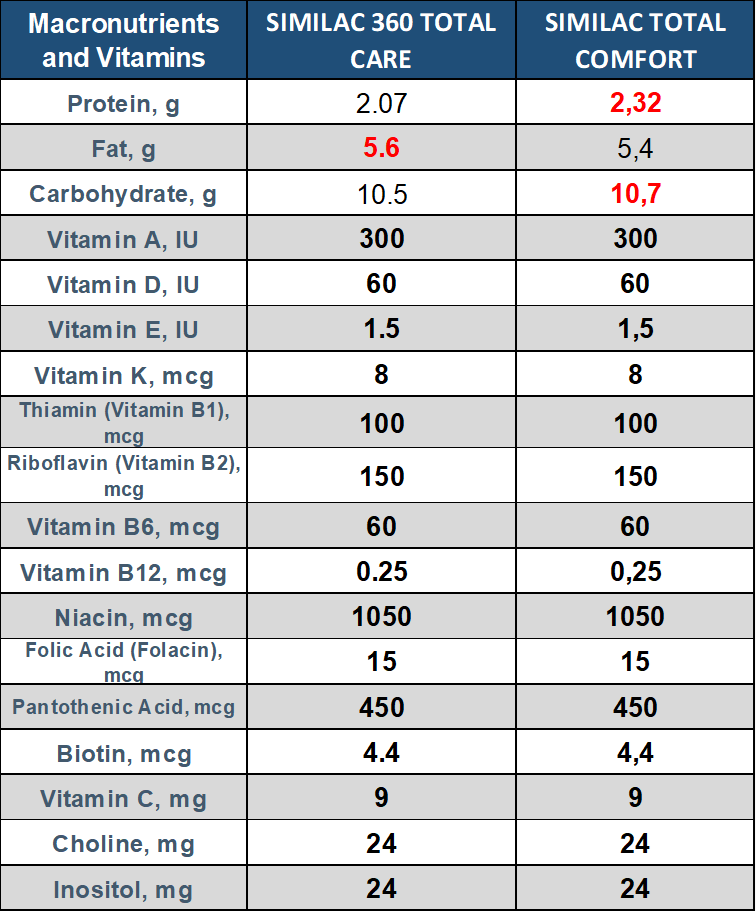
Protein, Fat, and Carbohydrates:
Similac Total Comfort provides higher protein and carbohydrate content, providing a suitable option for infants with specific protein and energy needs. On the other hand, Similac 360 Total Care exhibits a higher fat level, contributing to the overall energy needs crucial for growth and development. Despite these macronutrient differences, both formulas are meticulously designed to deliver the essential nutrients required for the well-being of infants.
Vitamins:
The vitamin profiles in both formulas, including Vitamin A, D, E, K, and various B vitamins, are identical. These vitamins support the baby’s immune system, bone development, vision, and overall growth. The consistency in vitamin content ensures that infants receive essential nutrients required for their well-being.
Minerals:
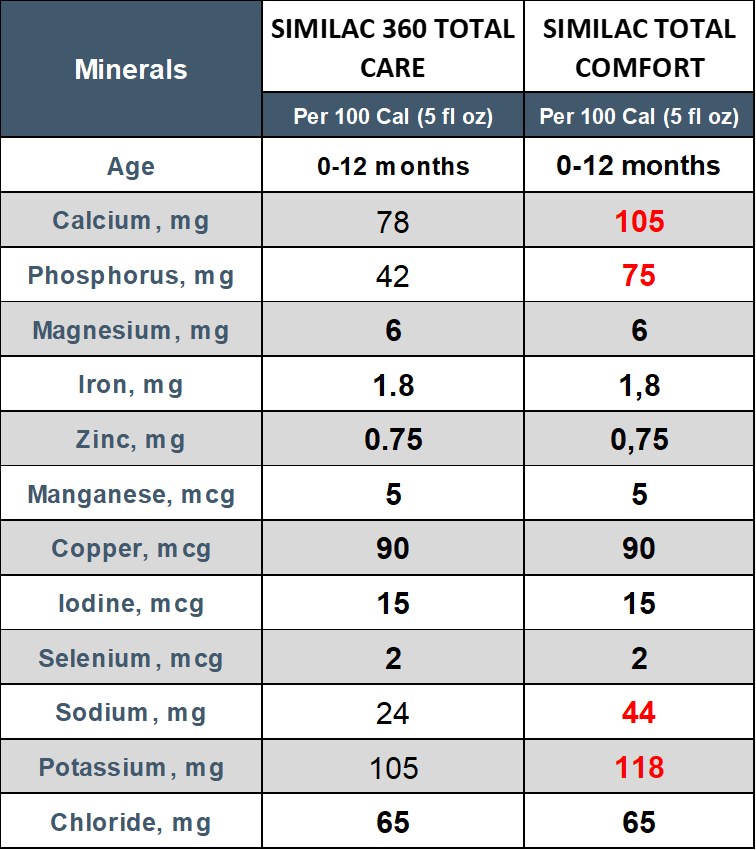
In terms of minerals, Similac Total Comfort provides high levels of Calcium (an essential mineral crucial for bone development, blood clotting, and nerve function), Phosphorus (supports the development of strong bones and teeth), Sodium (important for maintaining fluid balance and nerve function), and Potassium (contributes to fluid balance, nerve transmission, and muscle contraction).
Price Comparison:
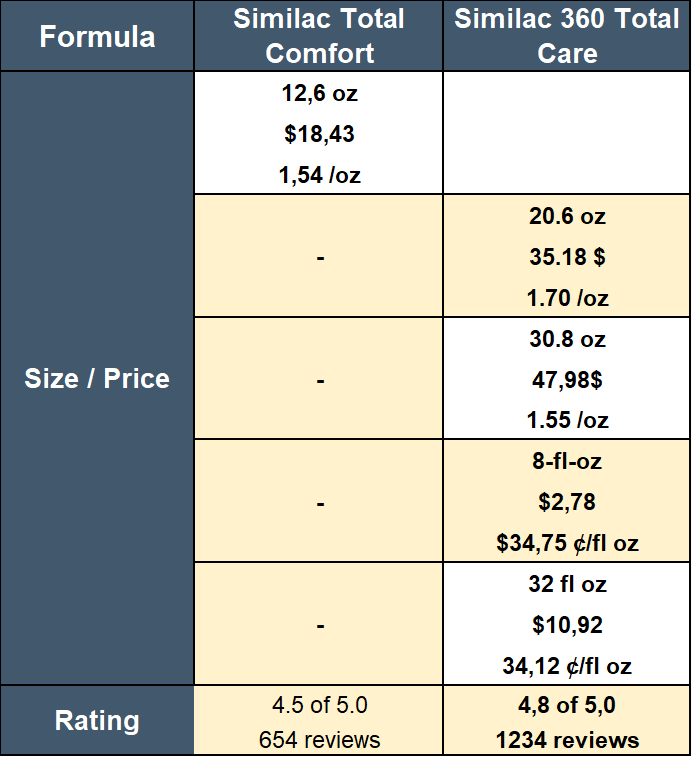
Price and Sizes:
In terms of pricing, Similac Total Comfort offers a competitive cost per ounce, making it an accessible choice for those on a budget or seeking smaller quantities.
Similac 360 Total Care, while generally having a slightly higher cost per ounce, provides a range of sizes and forms to accommodate various preferences and needs. The larger sizes, in particular, offer a more economical option for those looking to purchase formula in bulk.
Customer ratings indicate high satisfaction with Similac 360 Total Care due to its 5 HMO prebiotics and the easy-to-travel bottles. The choice between the two may depend on individual budget considerations, preferences, and the specific needs of the infant.
Where to Buy?
| SIMILAC TOTAL COMFORT | SIMILAC 360 TOTAL CARE |
|---|---|
| Buy 12.6 oz | Buy 20.6 oz |
| – | Buy 30.8 oz |
| – | Buy 2-fl-oz |
| – | Buy 8-fl-oz |
| Buy 32-fl-oz | |
| 4.5 of 5.0 654 reviews | 4.7 of 5.0 2290 reviews |
Alternative to Similac 360 Total Care:
1. Enfamil NeuroPro:
Enfamil NeuroPro is a popular alternative to Similac 360 Total Care, offering a unique blend of nutrients designed to support brain development. It contains MFGM (Milk Fat Globule Membrane), which is clinically proven to promote cognitive development. Enfamil NeuroPro also includes DHA, a type of omega-3 fatty acid crucial for brain and eye development. This formula is suitable for infants from birth to 12 months and aims to provide a comprehensive nutritional profile similar to breast milk. Read Similac 360 Total Care Vs Enfamil Neuropro.
2. Enfamil Enspire Optimum:
Enfamil Enspire Optimum is another alternative with a focus on providing complete and balanced nutrition for infants. It includes ingredients like lactoferrin and MFGM, contributing to immune support and cognitive development. Enfamil Enspire Optimum is designed to mimic the composition of breast milk closely. It also contains DHA and choline to support brain development. Read Enfamil Enspire Optimum Vs Similac 360 Total Care.
3. Similac Pro Advance:
Similac Pro Advance is a part of the Similac family and is a notable alternative to Similac 360 Total Care. It is designed to support immune health through the inclusion of the prebiotic 2′-FL HMO. Similac Pro Advance also contains OptiGRO, a blend of DHA, lutein, and vitamin E to promote brain and eye development. Read Similac Pro Advance vs Similac 360 Total Care.
4. Gerber Good Start Gentle:
Gerber Good Start Gentle is a gentle formula alternative to Similac 360 Total Care, designed to ease fussiness and gas in infants. It features Comfort Proteins, small proteins for gentle digestion, and 2′-FL HMO for immune system support. Gerber Good Start Gentle is suitable for infants from birth to 12 months and aims to provide a more comfortable feeding experience. Read Similac 360 Total Care Vs Gerber Good Start Gentle.
5. HiPP Combiotic:
HiPP Combiotic is an organic European formula that serves as an alternative to Similac 360 Total Care. It is made with high-quality organic ingredients and follows strict European organic standards. HiPP Combiotic includes prebiotics, omega-3 and omega-6 fatty acids, and essential vitamins and minerals. It is suitable for infants from birth onwards and offers an option for parents seeking an organic formula.
Alternative to Similac Total Comfort:
1. Similac Pro Total Comfort:
Similac Pro Total Comfort stands out as the closest alternative to Similac Total Comfort. This formula is specifically designed to address common feeding issues such as fussiness and gas due to lactose sensitivity. It features partially hydrolyzed protein for easy digestion and 2′-FL HMO prebiotic for immune support. Similac Pro Total Comfort provides a gentle and easily digestible option for infants with mild tolerance symptoms. Read Similac Total Comfort Vs Pro Total Comfort.
2. Enfamil NeuroPro Gentlease:
Enfamil NeuroPro Gentlease is an alternative formula designed to offer gentle relief for infants with fussiness and gas. It includes the innovative NeuroPro blend, featuring MFGM (Milk Fat Globule Membrane) for cognitive development. This formula contains easy-to-digest proteins, making it suitable for infants with sensitive tummies.
3. Gerber Good Start Gentle Pro:
Gerber Good Start Gentle Pro is another alternative catering to infants with sensitive stomachs. It includes Comfort Proteins, small proteins for gentle digestion, and 2′-FL HMO for immune system support. This formula aims to provide a soothing feeding experience for babies while offering essential nutrients for their growth and development. Gerber Good Start Gentle Pro is suitable for infants from birth to 12 months.
4. Gerber Good Start SoothePro:
Gerber Good Start SoothePro is designed to ease common feeding issues such as colic, excessive crying, and fussiness. It includes a Comfort Proteins blend and L. reuteri, a probiotic that may help reduce colic symptoms. Gerber Good Start SoothePro is formulated to be gentle on the stomach, providing relief for infants with digestive discomfort. This formula is suitable for infants from birth to 12 months.
Conclusion:
Ultimately, the decision should be guided by a nuanced consideration of your baby’s specific health needs, any tolerance issues, and your budget constraints. Both Similac Total Comfort and Similac 360 Total Care stand as reputable choices within the Similac family, offering carefully crafted formulas that prioritize infant nutrition.

